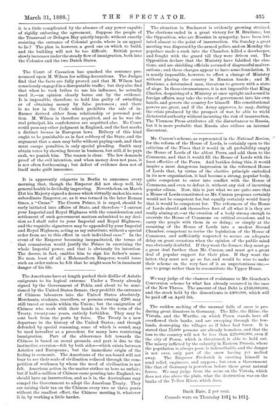Mr. Curzon's scheme, as represented in the National Review, for
the reform of the House of Lords, is certainly open to the criticism of the Times that it would in all probability empty the House of Lords of the ablest Peers, and add them to the Commons, and that it would fill the House of Lords with the least effective of the Peers. And besides doing this, it would inspire a most dangerous impression in the reformed House of Lords that, by virtue of the elective principle embodied in its new organisation, it had become a strong, popular body, quite competent to enter into conflict with the House of Commons, and even to defeat it, without any risk of incurring popular odium. Now, this is just what we are quite sure that a House of Lords constituted as Mr. Curzon proposes certainly would not be competent for, but equally certainly would fancy that it would be competent for. The reformers of the House of Lords should ask themselves first of all what it is they are really aiming at, —at the creation of a body strong enough to overrule the House of Commons on critical occasions, and to carry the people with them in so doing; or simply at the recasting of the House of Lords into a modest Second Chamber, competent to revise the legislation of the House of Commons, and sufficiently respected to secure an adequate delay on great occasions when the opinion of the public mind was obviously doubtful. If they want the former, they must go a great deal further than Mr. Curzon, and must get a great deal of popular support for their plan. If they want the latter, they must not go so far, and would be wise to make their scheme on the very face of it an unpretentious one,— one to purge rather than to reconstitute the Upper House.


































 Previous page
Previous page